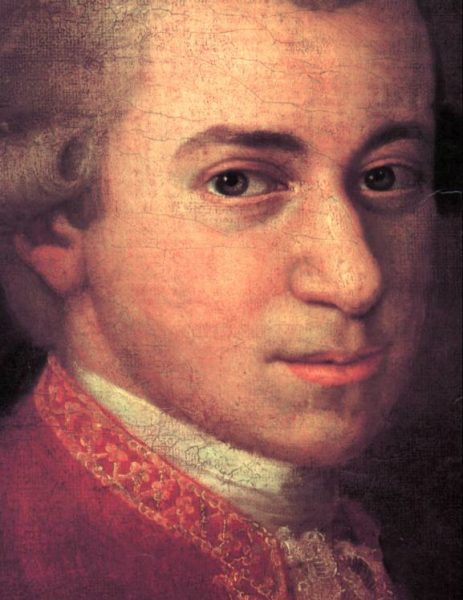 Born: 27th January 1756
Born: 27th January 1756
Died: 5th December 1791 (aged 35)
Baptised with the gloriously baroque names Johannes Chrysostomus Wolfgangus Theophilus Mozart, Mozart was born in Salzburg, Austria at the very end of the Baroque musical period. He was composing before he was 5 and was toured around the capitals of Europe by his father to display (and cash in on!) his prodigious performing skills on keyboard and violin. He moved to Vienna in 1781, aged 25, and stayed there for the rest of his life. Along with the likes of Haydn, he essentially defined the Classical musical period.
He is, of course, generally regarded as the greatest Classsical composer of all time, having written extensively in most genres and been influential on Beethoven (and beyond, naturally). As the Bluffers Guide to Music puts it, in its inimitable, hyperbolic style:
Everything he wrote is perfect with never a wrong note in it. The proper reaction to Mozart is to go glassy-eyed and full of inexpressible admiration. If you find Mozart's music boring, you had better keep this horrible fact to yourself: you might as well say that you don't like animals or can't see the point of cricket.
Personally... I like a lot of Mozart, but I do not love it... and, er... find a lot of it rather boring. Ooops.
I do manage to admire Le nozze di Figaro (otherwise known as The Marriage of Figaro) and Don Giovanni, which are probably the two greatest operas in the repertoire. I am also keen on all his horn concerti, too, and am fond of the last half-dozen of his numbered symphonies. Regardless of the specific likes and dislikes, he has somehow managed to get into my top-10 listened-to-of-all-time composers... so I would argue that I am not completely hopeless on the matter (though I really don't see the point of cricket!)
Mozart's music has, since 1862, been cursed with 'Köchel numbers' (pronounced 'kir-kəl'), when Ludwig von Köchel decided to put his music into a chronologically-organised catalogue. Thus, Symphony No. 40 is also known as K 550 and his Requiem is K 626. As I've explained elsewhere, however, the Köchel catalogue has a number of shortcomings which have got worse over time. I've therefore unilaterally decided to assign all of his works Dizwell Numbers. Symphony No. 40 is therefore now DZ 01052 and his Requiem is DZ 02082.
To allow you to work with -and convert between- the two numbering schemes with ease, I have produced a complete online catalogue of his works. Additionally, the complete catalogue has been broken down into its separate, thematic, sections as follows:
- Section 01: Symphonies
- Section 02: Choral works
- Section 03: Concerti
- Section 04: Orchestral
- Section 05: Opera
- Section 06: Keyboard works
- Section 07: Chamber works
- Section 08: Vocal works
As of 19th February 2020, the catalogue is now complete. That is to say, all items listed have had incipits prepared for them and, where possible, a 40-second music extract of the start of the work has been created and uploaded too (a sort-of 'audio incipit', if you like). All Dizwell Numbers are, therefore, now definitive and will not change further. if new works by Mozart are discovered, they will merely be appended to the existing numbers in an appropriate category. If existing works turn out not to be by Mozart after all, the notes associated with the item will be updated to reflect that fact, but no existing entries will be deleted.
Categories 7 and 8 still need their 'long notes' written. At the moment, a lot of information about each work in those categories has been shoved into the 'short notes', making them too long for formatting comfort! A proper re-working of the notes associated with all 248 works in those three categories will therefore now take place, and I expect that to be completed by the end of March 2020 whenever(!).
Once all long notes have been written, I'll pull together a comprehensive list of sources. For now, I'd like to acknowledge the now-defunct Mozartforum, whose Köchel catalogue, together with scholarly notes, is available to view via the Wayback Machine. I'd also like to recommend The Compleat Mozart, edited by Neal Zaslaw and William Cowdery. There are plenty of other sources I've used, but I'll put that list together later.
Music Plays from my collection
(since January 9th 2021)
| Date of Play | Time of Play | Genre | Composition | Length | Play Count |
|---|---|---|---|---|---|
| Date of Play | Time of Play | Genre | Composition | Length | Play Count |